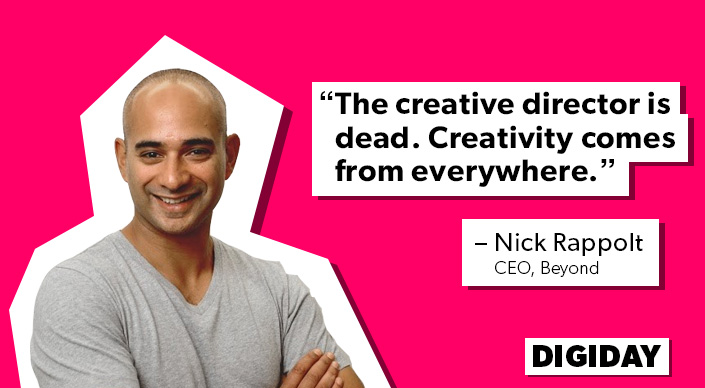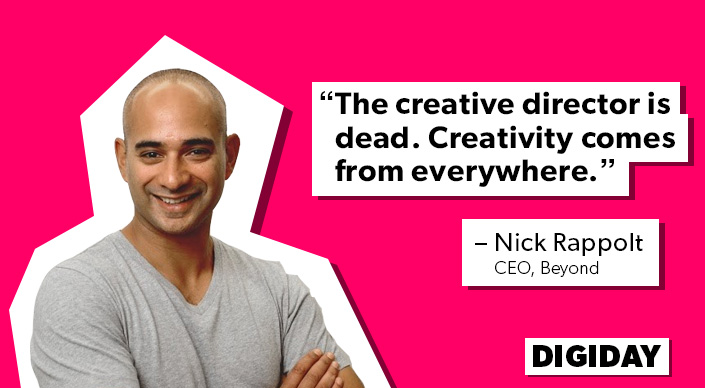Last chance to save on Digiday Publishing Summit passes is February 9

This is “View from the Top,” the latest in a Digiday series featuring creative leaders talking about their career paths and leadership perspectives. Read previous interviews here.
After only 15 years in the marketing industry, Nick Rappolt is already a startup founder twice over. Rappolt launched a PR agency called Credo Communications at age 24; it was acquired two years later by Bite Communications. He then convinced the chairman of Bite’s holding company, Next15, to let him start a new digital agency within its stable, called Beyond.
Since 2010, Beyond has grown its revenue from $1 million to $12 million and has won prestigious clients like Virgin, Google and Facebook. Along the way, it has acquired three companies and has established offices in London, San Francisco and New York.
The agency hasn’t been able to avoid some of the common pitfalls its contemporaries have experienced, though. Like many agencies, Glassdoor reveals it is a company experiencing growing pains resulting in high staff turnover and long hours. Added to that, its acquisition of Content and Motion wasn’t so successful either.
But fighting to improve morale and grow a business company is a piece of cake compared to the battle he faced seven years ago. Rappolt was attacked with an knife by a gang when he was on his way home one night. The incident left him fighting for his life.
Here, Rappolt gives Digiday an insight into the personal and professional battles he’s faced, and how the incident drove him on to succeed.
How did the attack change your view on working life?
When a life-threatening incident like that happens, it really makes you think. It drove me to do the things that I really wanted to do. I don’t want to look back in life and think, “Shit, I could have done that.”
You took a risk founding Beyond. But what made you try digital instead of sticking with PR?
The way products and services are designed is probably the “marketing” of tomorrow. I wanted to be involved in that. The CMO will soon get a bigger IT budget than the IT department. Second, the creative director is dead. Creativity comes from everywhere, especially in a company where you have so many different skill sets.

You risk alienating creative directors.
Agencies built for this are much more complex to the kinds of agencies which came before them. On any one project, we’d have a data researcher, strategist, UX person, designer. Then you’d have a product owner, a producer, a front-end developer, a back-end developer, dev ops, quality assurance, technical director. You’re looking at 11 different people with different skill sets. That’s exciting.
Fast growth can be chaotic. How have you adapted?
There are growing pains when you’re a new business. You never really have the all the right processes in place right from the off. When we originally started we had the development team in London and the analytics team in San Francisco. We split projects over those time zones for two years, but it burnt people out and caused communication problems. Now we put our core services wherever our clients are and let our teams go wherever the work is.
What happened with Content and Motion?
We got some talented people and we learned a lot, but we didn’t get as much from it as we wanted. It wasn’t a stepping stone for faster growth. It failed because of a lack of financial and investment planning on our side. [Also], when you acquire smaller companies, they all have their own way of working. We [mistakenly] looked at it and said, ‘OK, how can we bolt it on?’
Everyone wants a piece of the content-marketing pie.
We do a lot of content still, but I get your point. I think it’s important [agencies] don’t lose focus, or you can lose your identity and don’t focus on what you’re good at. If you try and do too many new things, you confuse yourself, your clients and the people in your company.
How do you decompress?
I play a lot of racing games on my phone to switch my brain off when I’ve got a bit of down time. I’m also film guy. I use the American version of Netflix through a browser called Collar. There’s a series called “30 for 30” by ESPN with 30 different documentaries about 30 different sports people created by 30 different great film-makers for ESPN’s 30th anniversary. It’s boxing, NFL, athletics, football. I’m hooked on that at the moment.
More in Marketing

Star power, AI jabs and Free Bird: Digiday’s guide to what was in and out at the Super Bowl
This year’s Big Game saw established brands lean heavily on star power, patriotic iconography and the occasional needle drop.

In Q1, marketers pivot to spending backed by AI and measurement
Q1 budget shifts reflect marketers’ growing focus on data, AI, measurement and where branding actually pays off.

GLP-1 draws pharma advertisers to double down on the Super Bowl
Could this be the last year Novo Nordisk, Boehringer Ingelheim, Hims & Hers, Novartis, Ro, and Lilly all run spots during the Big Game?





